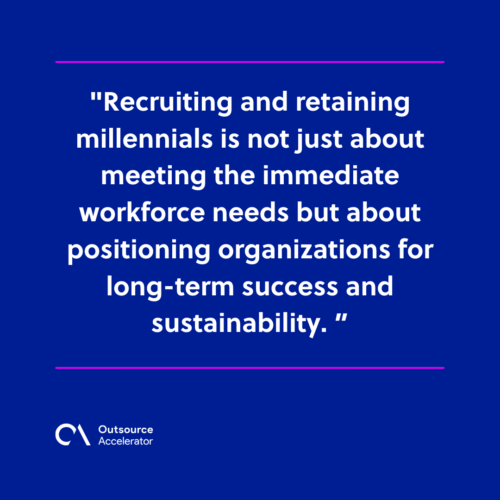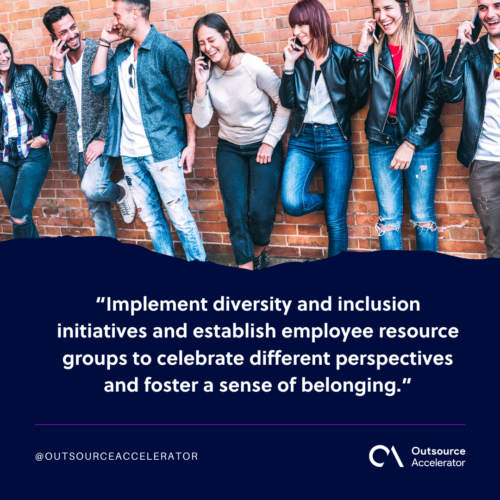How to recruit and retain millennials in the workplace

The millennial generation has risen as a driving force reshaping the dynamics of recruitment and employee retention.
According to The Washington Post, millennials make up the largest workforce generation today, bringing a unique set of expectations, values, and skills to the table. This makes them a coveted talent pool for organizations across industries.
To attract this group, employers must adapt their recruitment and retention strategies to align with millennial desires and motivations.
In this article, we delve into how to recruit and retain millennials. We’ll explore key insights, strategies, and best practices to help your organization attract and engage this talent for the long haul.
Rise of millennials in the workplace
Over the past decade, the workplace landscape has witnessed a significant transformation as the millennial generation has risen to prominence.
Millennial employees are born between 1981 and 1996. With their sheer numbers and unique set of skills, they have become the most significant portion of the workforce.
Millennials boast a high level of education, with many placing great importance on obtaining a college degree and continuous learning. As a result, they’ve gained innovation, problem-solving, and technology utilization capabilities.
As the work environment became more digital, millennials grew to fit right in. Employers began to realize the potential of this demographic, and competitive hiring for skilled millennials has only increased.
Organizations must adapt their strategies to effectively recruit and retain millennials and create workplaces catering to millennial values and expectations. This includes fostering an environment of growth, inclusivity, and purpose.

Characteristics of millennial employees
Millennials exhibit a unique set of characteristics and traits that distinguish them from previous generations in the workplace.
While it’s essential to avoid making sweeping generalizations about any generation, here are some common characteristics often associated with millennial employees:
Desire for meaningful work
One notable characteristic of millennial employees is their strong desire for meaningful work. This generation often seeks work that aligns with their values and a sense of purpose.
Millennials are often motivated by creative work, the opportunity to share their gifts, and the chance to impact others positively and within their communities.
They seek purpose and fulfillment in their careers and are more likely to be engaged when their work reflects this. This also means that they are more inclined to choose employers who demonstrate social responsibility and sustainability.
Emphasis on work-life balance
Another characteristic is the emphasis that millennials place on work-life balance. They strive to find a healthy equilibrium between their personal and professional lives, valuing flexibility in their work arrangements.
This is because this generation values the opportunity to pursue personal interests and maintain a sense of well-being outside of the workplace.
Development expectations
Millennials expect employers to prioritize their well-being and care about their holistic development. They opt for employers that are:
- Providing resources and support for mental and physical health
- Promoting a positive work environment
- Offering professional growth and advancement opportunities
Employers who demonstrate genuine concern for the well-being of their millennial employees will likely enjoy higher levels of engagement and loyalty.
Technological capability
Millennials are known for being tech-savvy and adaptable to new technologies. Having grown in the digital age, they are comfortable with software tools, and many expect their employers to have a strong technological infrastructure in place.
This generation values efficient and streamlined processes and appreciates opportunities to leverage technology to enhance productivity and collaboration.
Keep in mind that while these characteristics are common among millennials, there is still considerable individual variation within the generation.
Effective management and engagement strategies should catered to each employee’s unique preferences and strengths.
Why it is important to recruit and retain millennials
Recruiting and retaining millennials is of paramount importance for organizations for several compelling reasons:
Size of the millennial workforce
Millennials make up a significant portion of the current workforce, and their numbers will only continue to grow as the older generation retires.
Businesses must tap into the millennial employee resource to maintain a skilled and productive talent pool.
Fresh perspectives and innovative thinking
Millennials bring a fresh perspective and innovative thinking in the workplace. They grew up in a digital era and are adept at leveraging new technologies.
This digital fluency enables them to contribute valuable insights and adapt quickly to emerging trends. By recruiting and retaining millennials, organizations can infuse their teams with creativity and a forward-thinking mindset.
Commitment to purpose-driven work
Millennials prioritize a sense of purpose and fulfillment in their work. Companies that align with those values and demonstrate social responsibility are more likely to attract and retain top millennial talent.
A well-engaged and motivated millennial workforce can boost productivity and create a positive work culture.
Future-proofing leadership
Millennials are known for their continuous learning mindset and desire for personal and professional growth. This matters for the future of your business.
As older generations retire, millennials are stepping into leadership roles. Ensuring a smooth leadership transition is crucial for the long-term success of organizations.
Companies that effectively recruit and retain millennials also send a positive signal to prospective employees. This makes them attractive employers for future generations as well.
Recruiting and retaining millennials is not just about meeting the immediate workforce needs but about positioning organizations for long-term success and sustainability.
Companies that recognize the value of millennials and invest in their recruitment and retention are more likely to thrive.

Challenges in recruiting millennial employees
Recruiting millennial employees, while rewarding, comes with its own set of challenges that organizations need to navigate effectively.
Here are some of the challenges in recruiting millennial employees:
High expectations
Millennials often have high expectations for their employers. They seek meaningful work, competitive compensation, growth opportunities, and work-life balance.
Meeting these expectations can be difficult for some organizations. Coupled with the tendency for millennials to hop jobs frequently, this poses a challenge for retention.
Technological challenges
In the first place, traditional recruitment channels may not always work with millennials, who are more technologically savvy than their predecessors.
This also extends to the jobs themselves. As digital natives, millennials may expect employers to provide up-to-date technology and tools to support their work. Outdated systems can be a turn-off.
Competitive market
Due to the large number of millennials in the workforce, there is significant competition among employers to attract the best talent. This can make it challenging to stand out as an employer of choice.
8 ways to recruit and retain millennials in the workplace
To effectively recruit and retain millennials in the workplace, organizations can implement several strategies that cater to their preferences and needs.
Here are eight effective ways to attract and retain millennial talent:
1. Emphasize company culture and values
Millennials value a positive and inclusive work culture that aligns with their personal values.
During the recruitment process, highlight your company’s mission, vision, and values to attract candidates who resonate with your organization’s culture.
2. Leverage online platforms and social media
Millennials are highly active on social media and online platforms. Utilize social media channels and online job boards to promote job openings and engage with potential candidates.
Showcase your company culture and employer branding efforts through videos and authentic employee testimonials.
3. Offer flexible work arrangements
Millennials appreciate flexible work arrangements that allow for work-life balance and autonomy. Consider offering options like remote work, flexible scheduling, or compressed work weeks.
The ability to maintain personal commitments alongside work is attractive to millennials and can increase their job satisfaction and loyalty.
4. Provide opportunities for professional growth
Millennials are eager to learn and develop new skills. Offer formal training programs, mentorship opportunities, and chances for career advancement.
You can also consider implementing regular performance reviews and goal-setting processes to provide millennials with a clear path for growth within the organization.
5. Enable work-life integration
Acknowledge that millennials value work-life integration rather than strict separation. Think about putting in place guidelines that promote work-life balance, such as:
- Flexible parental leave
- Wellness programs
- Mental health support
By prioritizing employee well-being, you can create a positive work environment that resonates with millennials.
6. Embrace technology and digital tools
Millennials have grown up with technology and expect efficient and streamlined work processes. Provide access to modern technology tools and digital platforms that facilitate collaboration and communication.
Embracing technology improves productivity and shows that your organization values innovation.
7. Foster a diverse and inclusive environment
Millennials appreciate diversity and inclusion in the workplace. Ensure your organization promotes diversity in hiring practices and creates an environment where employees feel valued and respected.
Implement diversity and inclusion initiatives and establish employee resource groups to celebrate different perspectives and foster a sense of belonging.

8. Demonstrate commitment to social responsibility
Millennials are passionate about making a positive impact on society, and they value organizations that share this commitment.
Highlight your company’s corporate social responsibility efforts, sustainability initiatives, and community involvement. Engage millennial employees in volunteer activities and give them opportunities to contribute to meaningful projects.
It is important to understand that the preferences and needs of millennials may evolve over time. Continuously adapting and evolving your recruitment and retention strategies will ensure long-term success in engaging and retaining this valuable demographic.
Embracing millennials in the workplace
Millennials are set to be the pioneers of a new era in the workplace. Their entrance into the workforce has ushered in a transformative wave, challenging organizations to adapt and evolve.
The strategies for recruiting and retaining millennials that we’ve explored in this article are not only a response to their unique preferences but also a blueprint for shaping the next generation of work.
The journey doesn’t stop with millennials, either. As Generation Z and subsequent generations join the workforce, they will bring their own sets of values, expectations, and skills.
The adaptability and forward-thinking strategies discussed in this article serve as a foundation to remain agile in the face of changing demographics and workplace dynamics.
In the end, a company’s success hinges on its ability to harness the unique strengths of each new age group. We must recognize that diversity in all its forms is a wellspring of innovation and progress.







 Independent
Independent




